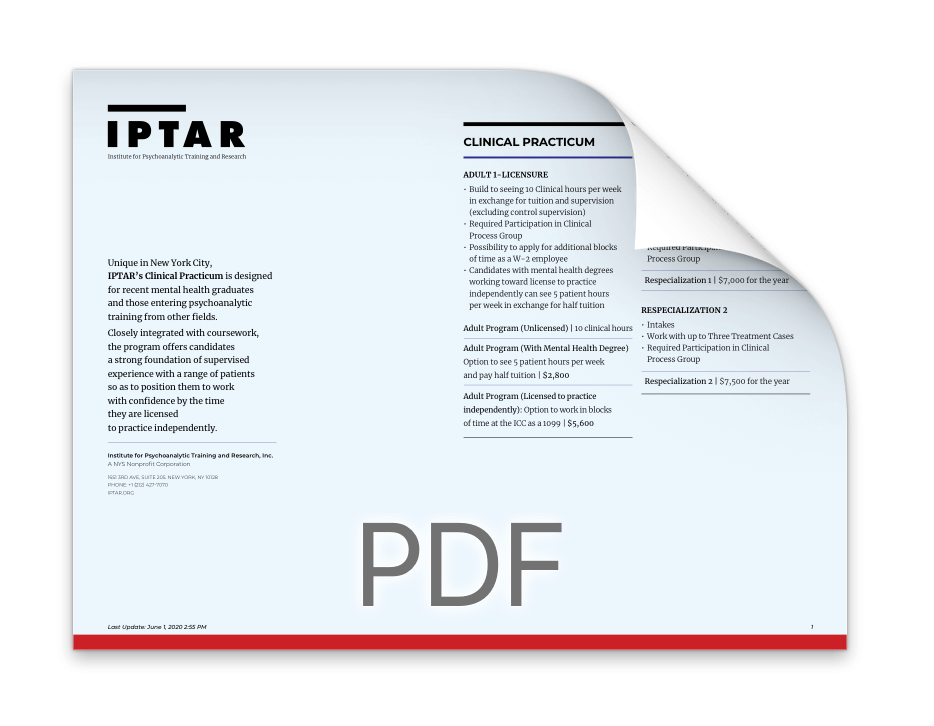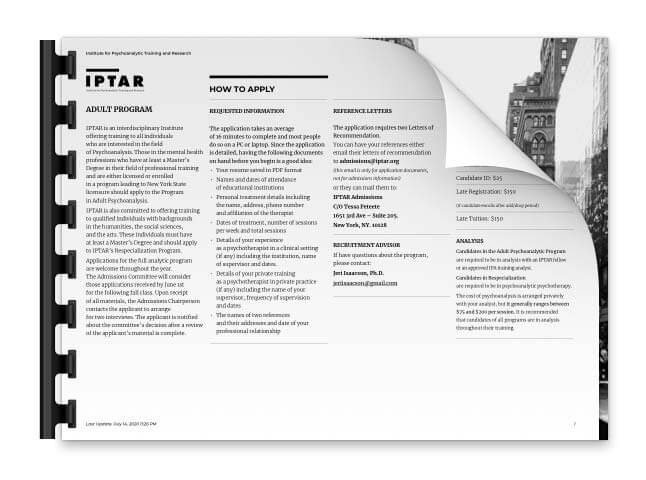Adult Program
Training in Adult Psychoanalysis.
The Adult Psychoanalytic Program will teach you to deeply understand human character and development in the context of personal relationships, history, and culture. At the completion of this program, all clinicians will receive: Certificate of completion in Psychoanalysis, Membership in the IPTAR Society, Membership in the International Psychoanalytical Association (IPA), and the right to use the credential “FIPA” (Fellow of the IPA) after your name, and Membership in the Confederation of Independent Psychoanalytic Societies (CIPS)
Adult Psychoanalytic Training Overview
IPTAR training is comprised of the three traditional components of a psychoanalytic education: training analysis, curriculum and supervised psychoanalysis, also known as control work. Clinicians without a license will be eligible to sit for the NY State License in Psychoanalysis (LP) exam during their training. Psychologists, social workers and other mental health providers can apply to the adult psychoanalytic training to deepen their psychoanalytic studies.
Timeframe for coursework/training
- Each candidate completes course work in a minimum of four years
- Candidates are required to participate in Training Analysis (detailed later) and have 2 control cases in order to graduate
- The timeframe for training varies as control work includes treating two patients in analysis with supervision. Details below
Training Analysis
The training analysis is central to psychoanalytic practice. By providing candidates with an experience of their own unconscious life, conflicts, and dynamics, it has personal value and enables the development of self-awareness and self-knowledge, essential to empathizing with patients and working in the transference and counter-transference. A training analysis is a means of understanding the basis of psychoanalysis in ways not possible through coursework or supervision alone, and it adds a personal, experiential dimension to the theoretical concepts and methodology of psychoanalysis. Deep conviction about the psychoanalytic process and method comes from the experience of simultaneously analyzing one’s patients and being in psychoanalysis oneself.
The Curriculum
The program’s curriculum is governed by a contemporary Freudian perspective. Rooted in the original Freudian text, the curriculum includes important elaborations and transformations of the original concepts that have led to today’s expanded understanding of psychopathology, development, technique, and application. A psychoanalytic education enables a therapist to choose the best treatment modality to maximize the patient’s potential for growth. Teaching is done in the context of clinical illustration, making theoretical learning relevant to actual practice.
Adult Analytical Course descriptions
IPTAR Clinical Center (ICC)
Unique in New York City, IPTAR has designed a clinical training model that prepares and supports recent mental health graduates and those entering psychoanalytic training from other fields. This model emphasizes clinical experience as a key component of your training.
Licensed
Fully licensed practitioners (LCSW, PsyD, etc) can see patients at the ICC with free supervision. Those who do not work at the ICC would need to pay for IPTAR supervision.
Licensed candidates that cannot practice independently (LMSW, for example) are required to work 5 hours per week in the IPTAR Clinical Center (ICC).
Unlicensed
Unlicensed candidates (those who cannot see patients without supervision) are required to work 10 supervised clinical hours per week at the ICC throughout the academic year. These candidates receive free supervision (non-control work) and membership in a Clinical Process Group of their choice. As such, unlicensed candidates are required to be full time for their first two and a half years. By the end of the second year, candidates should have accumulated around 1000 clinical hours- enough to sit for the LP licensing exam.
Supervised Psychoanalysis
Supervised psychoanalysis (also known as Control Work) at IPTAR is conducted after a candidate has completed their requirements and passed the Oral Readiness for Control interview. Control work consists of two complementary learning experiences:
- the weekly supervision of the candidate’s clinical work by an IPTAR Fellow
- a review of the candidate’s yearly written descriptions of each case’s developing the analytic process.
The primary emphasis of weekly supervision is on the development of the candidate’s clinical skills. The candidate treats two analytic patients, each at a frequency of four times per week, under the supervision of an IPTAR Fellow. One case is supervised for a minimum of three years; a second case for a minimum of two years.
Admissions
IPTAR is an interdisciplinary Institute offering training to all individuals who are interested in the field of Psychoanalysis. Those who have at least a Master’s Degree in the mental health professions and are either licensed or enrolled in a program leading to New York State licensure should apply to the Program in Adult Psychoanalysis.
IPTAR is also committed to offering training to qualified individuals with backgrounds in the humanities, the social sciences, and the arts. These individuals must have at least a Master’s Degree and should apply to IPTAR’s Respecialization Program.
Applications for the full analytic program are welcome throughout the year. The Admissions Committee will consider those applications received by May 1st for the following fall class. Upon receipt of all materials, the Admissions Chairperson contacts the applicant to arrange for two interviews. The applicant is notified about the committee’s decision after a review of the applicant’s material is complete.
Deadline for Applications
Adult Program: The 2025 Application Deadline is May 1st. After that date, applications will be considered as space is available.
Information Needed for Application
The application takes an average of 16 minutes to complete and most people do so on a PC or laptop. Since the application is detailed, having the following documents on hand before you begin is a good idea:
- Your resume saved in PDF format
- A personal essay
- Names and dates of attendance of educational institutions
- Personal treatment details including the name, address, phone number and affiliation of the therapist
- Dates of treatment, number of sessions per week and total sessions
- Details of your experience as a psychotherapist in a clinical setting (if any) including the institution, name of supervisor and dates.
- Details of your private training as a psychotherapist in private practice (if any) including the name of your supervisor, frequency of supervision and dates
- The names of two references and their addresses and date of your professional relationship
Reference Letters
The application requires two Letters of Recommendation.
You can have your references either email their letters of recommendation to admissions@iptar.org (this email is only for application documents, not for admissions information)
or they can mail them to:
IPTAR Admissions
C/O Camille Starling-Dade
1651 3rd Ave – Suite 205. New York NY 10128
Please go to the bottom of this page to complete the application for the program in Adult Psychoanalysis.
Contact
If have questions about the program, please contact:
Co-Chairs of Admissions:
Sujatha Subramanian & Ulya Habif-Afres
sujathasmail@gmail.com — ulyahabifafres@gmail.com
Chair of Recruitment:
Masha Mimran
mashamimran@gmail.com
Technical Problems / Support
If you experience any issues with the form, please contact help@iptar.org


